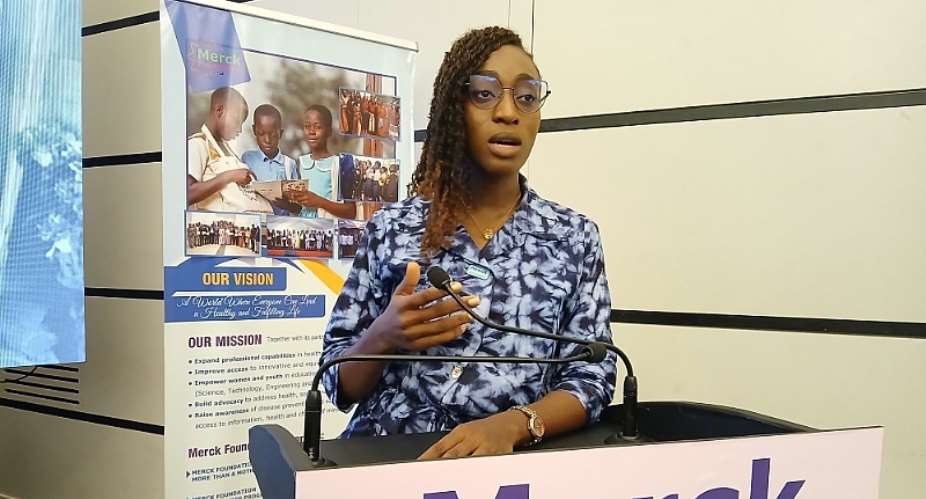Dr Emefa Adzo Dzordzorme, a Resident Psychiatrist, Accra Psychiatric Hospital, says infertility is a contributing factor to mental disorders among childless couples, particularly women.
Dr Dzordorme said the psychological issues and challenges those women experience were exacerbated by stigma.
The Resident Psychiatrist was speaking at a training programme for Health Journalists in Accra, organised by Merck Foundation in collaboration with the Ghana Journalist Association (GJA).
The Media training forms part of a community awareness programme by Merck Foundation in partnership with Mrs Rebecca Akufo-Addo, First Lady of the Republic of Ghana, also an ambassador of “Merck Foundation More Than a Mother” campaign.
Infertility is defined as trying to get pregnant with frequent unprotected sex for at least a year without success, and women mostly suffer the brunt, though the problem could be from both husband and wife or one of them.
In most Ghanaian societies, childless women are often mocked even where many had gathered, such as workplaces, churches, family gatherings, and other social events, which could compound the already psychological issues affecting them.
According to experts, one in five people in Ghana suffers from a significant mental health challenge, and infertility-related issues and stigma were contributing factors to the condition.
Dr Dzordzorme said issues of infertility could cause mental distress and make people have low self-esteem as they internalize some of the expectations of society, which could trigger depressive episodes such as bipolar disorder and schizophrenia, as well as a relapse.
“Infertility does not cause mental illness, but it contributes to the development and maintenance of a mental illness, so for instance, if someone is going through infertility and the person starts having persistently low moods, you will realise that nearly every day of the week, the person is sad, not going out, and no longer doing things that make her feel happy anymore,” she stated.
The Resident Psychiatrist encouraged people suffering from infertility to seek help from specialists such as a psychological obstetrician or gynaecologist to deal with the biological issues as well as the social and psychological aspects.
“Sometimes the stigma or stressor is from a family member, someone who does not understand the implications of infertility, so we sit down with the family, trash issues out, explain what is going on, and be on the same page with everyone.”
Dr Dzordzorme advised individuals not to suffer alone since help was available, saying, “Whether you are going through infertility stigma, or mental health challenges, there are specialized practitioners available to help.”
She also urged the public to walk into the Accra Psychiatric Hospital and any of the regional hospitals and mental health units in the districts to seek help.
GNA





 ‘I’m sorry’ — Kennedy Agyapong apologises to his followers for supporting Bawumi...
‘I’m sorry’ — Kennedy Agyapong apologises to his followers for supporting Bawumi...
 Don’t let Hopeson Adorye lead you to your grave; he’s cursed — Allotey Jacobs wa...
Don’t let Hopeson Adorye lead you to your grave; he’s cursed — Allotey Jacobs wa...
 No pastor can boldly say he’s richer than me; I’d have imported 5 airplanes, 5 p...
No pastor can boldly say he’s richer than me; I’d have imported 5 airplanes, 5 p...
 ‘Locked up health supplies: Gov’t made a silly mistake for letting health preven...
‘Locked up health supplies: Gov’t made a silly mistake for letting health preven...
 A prophetess, a ‘small boy’ warned Kutu Acheampong of a planned coup on specific...
A prophetess, a ‘small boy’ warned Kutu Acheampong of a planned coup on specific...
![(Rtd)Captain Joel Sowu [left] and Dr. Kwame Nkrumah](https://cdn.modernghana.com/content__/84/56/6172024123202-k5fri7t2h0-captain-joel-sowu-and-kwame-nkrumah.jpg) I must be sick in the head not to acknowledge Kwame Nkrumah as Ghana’s founder, ...
I must be sick in the head not to acknowledge Kwame Nkrumah as Ghana’s founder, ...
 ‘Common Kenkey, Gobɛ will soon be priced in dollars because the economy has been...
‘Common Kenkey, Gobɛ will soon be priced in dollars because the economy has been...
 Failed 1V1D, other wasteful projects will be eliminated if elected — Mahama
Failed 1V1D, other wasteful projects will be eliminated if elected — Mahama
 Indelibly cursed 'baby with sharp teeth' Ablakwa must stop the Akan-hating and b...
Indelibly cursed 'baby with sharp teeth' Ablakwa must stop the Akan-hating and b...
 Asking Ghanaians to make you president again is insulting, disrespectful — Mirac...
Asking Ghanaians to make you president again is insulting, disrespectful — Mirac...
